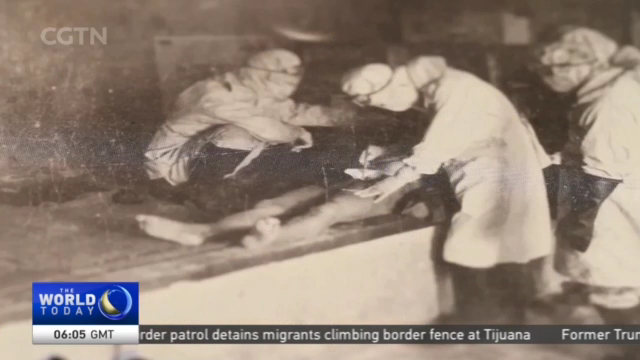
14:44, 13-Dec-2018
National Memorial Day: Documentary revealing Japanese army's atrocities unveiled in US
Updated
14:41, 16-Dec-2018
03:15

Unit 731 was a part of the Japanese Imperial Army that committed some of the most horrific biological warfare experiments in history. But in the West and around the world, most people have never heard anything about Unit 731. That's why a North-American filmmaker is exploring the subject in a new documentary, also revealing the U.S.'s role in allowing the perpetrators to escape justice. Mark Niu has the story.
At the office of San Francisco's Pacific Atrocities Education, a new documentary – Unit 731: How America Exploited Japan's Biological Weapons Crimes -- is being screened for the first time in the United States.
It was five years ago while working in China that journalist Paul Johnson first heard about the Japanese Imperial Army's Unit 731 and its biological experiments on thousands of Chinese civilians.
"Infected with deadly diseases and then dissected."
PAUL JOHNSON FILM DIRECTOR "I was outraged morally that this was something that had happened and we don't know about this. This isn't taught like other events that are similar in barbarity are taught. So I started investigating."
Johnson also traveled throughout China to find victims who believe they were infected by the Japanese Imperial army's germ bombs.
To this day, they have what is known as rotten leg syndrome- a condition where open wounds never heal.
NIKKI ARCADO RESEARCHER, PACIFIC ATROCITIES EDUCATION "The film really brings about the fact that is this history going to disappear as the people who commit it disappear, as the survivors who were in that event disappear. And how do we hold on to that memory?"
MARK NIU SAN FRANCISCO "In his film, Johnson tracks down a member of Unit 731 who is still conflicted about the barbaric experiments he conducted on Chinese civilians and his own duty to serve the Japanese military. But the film unpeels more layers, by delving into how the United States chose not to go after those responsible for the crimes."
PAUL JOHNSON FILM DIRECTOR "The US literally made a deal with the devil. They knew who the perpetrators were, they knew who the leader was -- Shiro Ishi. In fact they had him in Tokyo, but word came from Washington we'll give you immunity from prosecution in exchange for the data that you developed of human experimentation."
His documentary raises even more controversial claims about the U.S.'s role.
A researcher in his film believes it's highly likely that the U.S. used that information gained from Unit 731 to conduct its own biological tests that were used during the Korean war.
While that remains shrouded in secrecy, Johnson says the U.S.'s failure to seek justice for war crimes is clear.
PAUL JOHNSON FILM DIRECTOR "And I think an apology is owed on behalf of Washington, D.C. and American people who would be appalled to know about this to the people of China. This was a very sad dark moment in human history. We should atone for it. As an American, I believe that's something we should do and only help our relationship with China."
Johnson also leaves viewers questioning whether biological weapons development in a number of Western countries could all be traced back to the notorious legacy of Unit 731. Mark Niu, CGTN, San Francisco.

SITEMAP
Copyright © 2018 CGTN. Beijing ICP prepared NO.16065310-3
Copyright © 2018 CGTN. Beijing ICP prepared NO.16065310-3